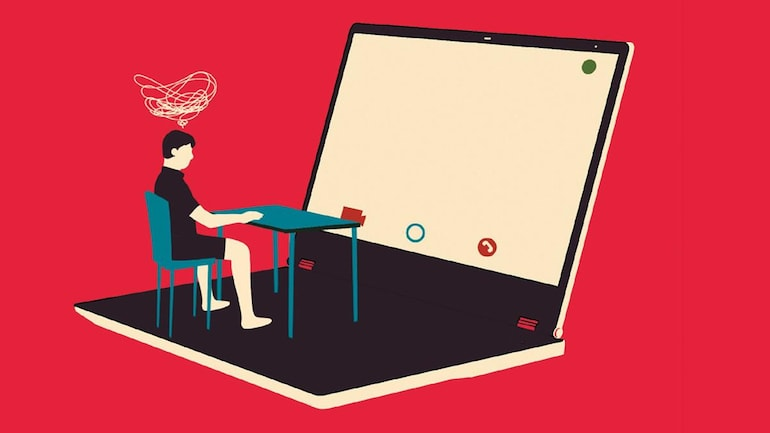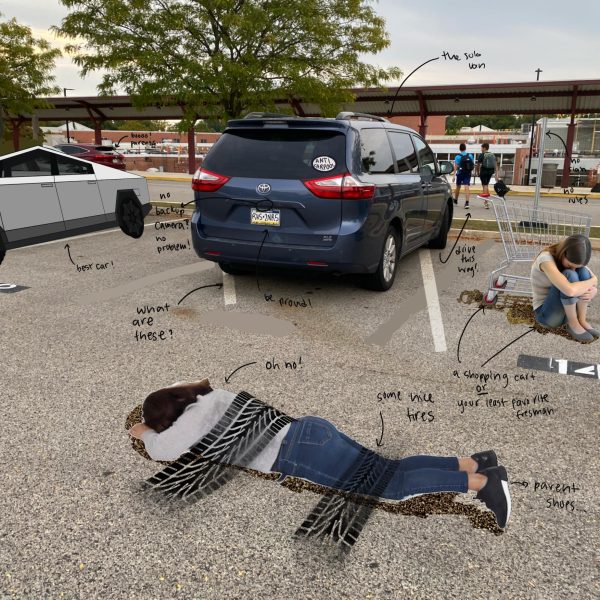Break or Fake? The Harsh Reality
https://www.indiatoday.in/magazine/education/story/20200511-are-online-classes-stressful-1673236-2020-05-02
April 21, 2021
Breaks from school have been the only opportunity for students to finally relax and enjoy their time away from the bleak screens glaring for over 6 hours and school days spent wearing suffocating masks all while being isolated from peers and the additional endless hours of completing homework from several classes after school. After sparsely placed single day holidays, asynchronous days, and snow days, a particular excitement was shared amongst Radnor High School students over the spring break. However, what better than to ruin students’ rare breaks with a project worth 50% of their semester grade or an essay due the day they return? We have all dealt with this frustration countless times during our experiences as students here at RHS, including this past spring break.
Assigning projects or long packets of work is not uncommon amongst RHS teachers, and from a teacher’s perspective, is completely understandable. Especially during this pandemic, teachers had to juggle teaching virtually and in-person, so students weren’t learning at a regular pace compared to past years. Break seemed to be the perfect opportunity for teachers to give students the chance of learning at least a bit more and keeping their minds fresh. With this logic, many teachers seem to disregard students’ rights to a well-deserved break and assign mountains of work. Students resoundingly report that having a genuine break is a necessity. We asked Diana Huang, a student taking several rigorous courses about her experience with assignments over break. She expressed that she was overwhelmed by the work and projects that were assigned over the break, including math homework, a Spanish project and Integrated assignments. She also admitted, “…knowing I had tests almost right after break was stressful”.
While RTSD has an adopted homework policy, it is remarkably vague. The document emphasizes that “homework shall neither substantially interfere with the student’s health and wellbeing.” Arguably, assigning work over break obstructs a student’s well being, but the homework policy isn’t clear with what assignments count as interfering with a student’s health. In the guidelines there are only four regulations, and they all fail to mention homework and tests during and after break. Between both RTSD’s homework policy and student handbook the problem at hand is completely overlooked. In fact, the word “break” — in the manner of a vacation — is never used in the entire 65-page document.
Unlike Radnor, our rival district, Lower Merion, has a policy about breaks in their student handbook:“Homework should not be given shortly before a Holiday Break that is expected to be completed over the Holiday Break.” In response to this policy, we interviewed Dr. Fritz, a teacher at Lower Merion School District. He remarked: “I really appreciate my district’s policy, as the district policy respects the idea of boundaries between work and rest, promoting the idea of health and wellness for all. The idea is that everyone actually takes a break during the break instead of using the break for work.” This fact rouses the question of whether RTSD should follow in LMSD’s footsteps and possibly establish guidelines in which we can have a real break, not one that is overshadowed by overwhelming assignments. It’s crystal clear that every student, regardless of grade, desires this.
The repetition of waking up early in the morning, attending school for over 6 hours, and arriving home to do further work doesn’t allow teenagers to live their lives. The typical school routine is the reason why kids crash into their bed immediately after getting home. After months of endless assignments, students desperately need a break.
Improving students’ mental health with a break does come at a cost to learning productivity. Having been away from RHS for a week, high schoolers forget much of what they previously learned and require a review of the lapsed material. Following the break, it would be a logical step to review what has been forgotten, but that isn’t always the case. Many students had assessments as soon as school resumed. The practice of distributing tests in such a timely manner only leaves two options for the test takers: to either use their vacation to do work or to do poorly on the exam. The most practical choice for students would be to take time from a break to do schoolwork, but if this is the case, what is the point of a break? Breaks are supposed to be one of the students’ only chances to unwind, but efforts to complete assignments, and let alone study for tests, diminish what a vacation should be.
As students resume school to take their AP tests and anticipate summer vacation, it’s important to take a closer look at students’ mental health. High school puts kids through some of the toughest and most rigorous times that they face their entire lives. Spending over nine months for four consecutive years focused strictly on school is not an easy feat for anyone. The effect that school places on students’ mental health isn’t just about kids complaining or crying, but truly, more than a quarter of high school students have experienced symptoms of clinical depression and other psychiatric conditions. Throughout RHS, it’s understood that breaks greatly improve students’ and teachers’ mental health, especially after the chaos of this year. Nevertheless, RTSD has not adopted a break policy, and despite the school’s rivalry with Lower Merion School District, LMSD’s policy regarding work around holiday break should not be overlooked at RHS. Breaks should be breaks, not extra time to do schoolwork.







